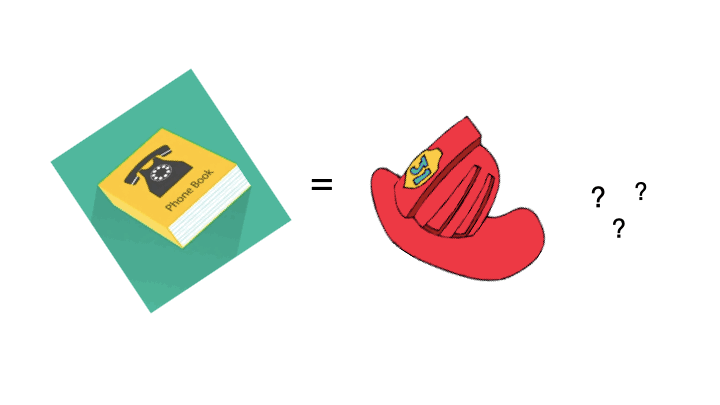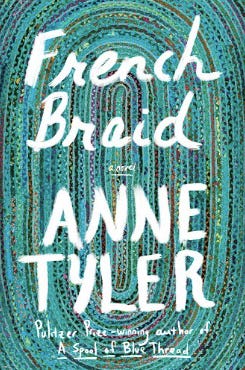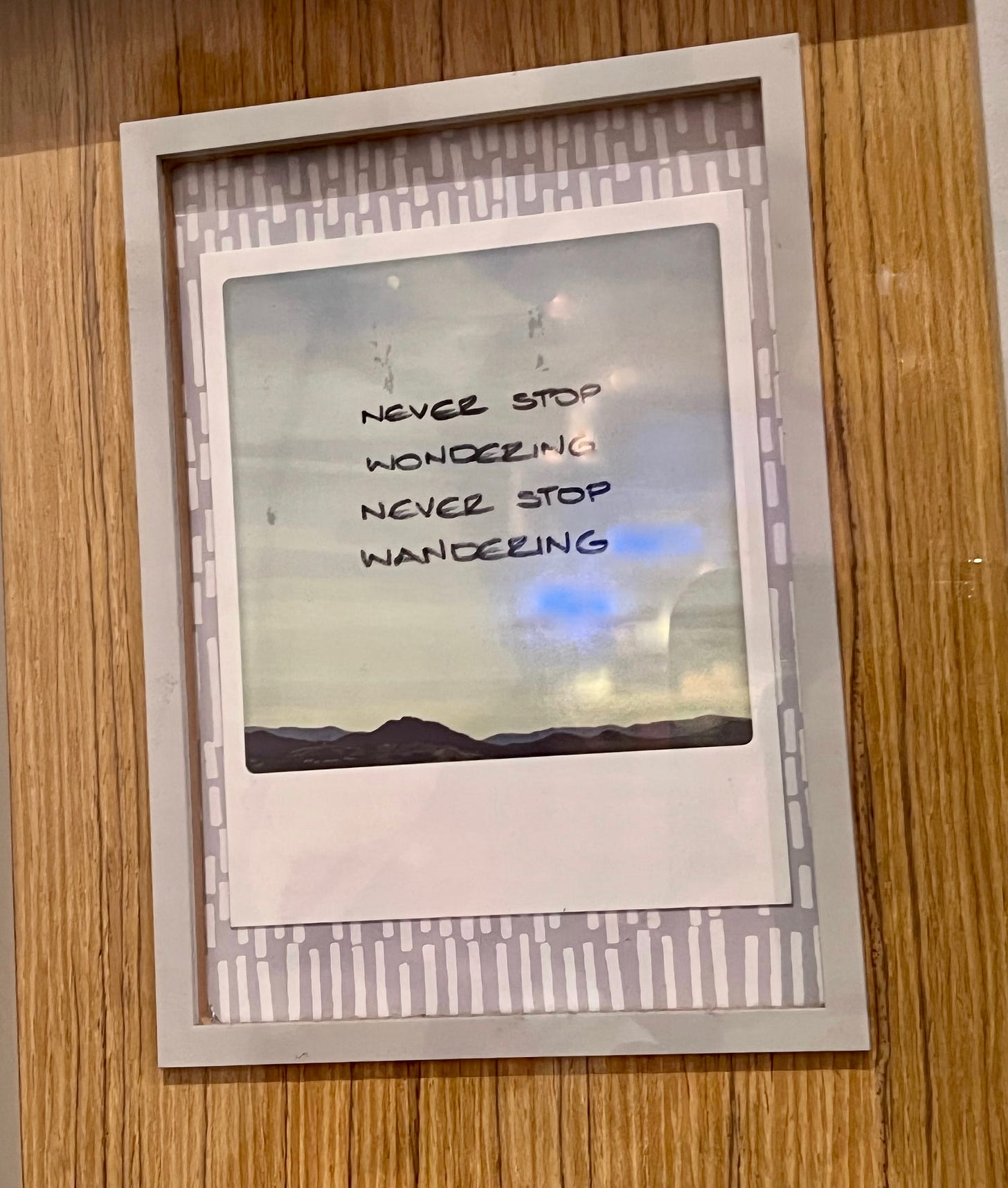Welcome! You’ve reached Spark. Learn more here or just read on. If you received this from a friend, please join us by subscribing. It’s free! All you have to do is press the button below. If you have already subscribed, welcome back! If you see something you like, hit that heart so others can find us more easily.

Let’s Talk: Familects
If people spend enough time together, all kinds of things happen, including a private language. What are some of the words that mean one thing to your family or close circle of friends and another (or nothing at all) to the rest of us?
What’s going on here
This week, I’m going to shut up (mostly) and invite you to fill in the blanks. As we’ve done a few times now since the the inaugural “Let’s talk” question, I’m offering a question or a prompt and seeing where it takes us. Instead of lots of links, I’ll just offer a few and try to leave a little space for you to jump in. This week: I want to know about your “familect.”
The Etymology of Fire Hat, Sangweech, and Sal Mineo
You can blame my husband for this post. He came across this brief essay by Kathryn Hymes from May 2021 about why we speak the way we do with our families or other close circles of friends. He is also the reason I can never see the word “sandwich” without hearing “sangweech” and the city “Albany” sounds like a man named Al Baney.
That got me thinking about my son when he was young. He was, like many small children, a rich source of innovative vocabulary that they tuck away when the age but the family remembers forever. Glove department. Carsastic. Fire Hat. Yes, Fire Hat.
Fire Hat: a term that captures the feeling of setting out with one goal in mind and ending up with something else entirely, preferably something more quixotic, whimsical and satisfying. Increasingly, it has come to mean that feeling when you walk into a room to retrieve a specific article and must walk out, then in again, to remember what it was. If you can. Bonus points if the thing you end up with shares the same phonetic beginning as the article you wanted in the first place.
Etymology: Years ago, when my son was about eight, we woke up on a snowy morning and wanted to go down to our favorite breakfast place but would it be open in this nasty weather? This was before the Internet so we’d have to call. We sent my son off to get the phone book while we remained warm in bed. Ten minutes elapsed. Twenty. About 35 minutes later, he wandered back into our bedroom wearing a red plastic fire hat he’d gotten somewhere along the line. He smiled pleasantly and sat on the bed and asked when we’d be going for breakfast.
“Where’s the phone book?” we asked.
A blank stare. Then he slapped his fire-hatted head as it all came back to him. He set out for the phone book but came across the fire hat. This led to all manner of diversions. The upshot was he got distracted, more interested in the possibilities offered by the fire hat and whatever else he came across between the upstairs and the downstairs.
These are not just words
How’s your plumbing, dear? Words from a family’s vocabulary convey more than a single meaning. They are references to people, places, times that come rushing back to us as soon as they are uttered. My father’s mother was convinced that most problems, physical, mental, and emotional, could be traced back to our digestion. Bran was encouraged. Prunes were on her table every morning. Whenever one or more of us was out of sorts, she would query, “How’s your plumbing, dear?” When I saw my cousins for the first time in years at my dad’s memorial service last fall, one of them imitated her perfectly and for a few seconds, she was with us all again.
Sal Mineo. At a certain point on any given evening with two old friends someone, at some point, is likely to utter the name Sal Mineo. We fall apart. My friend Janice snorts with laughter. Her husband and mine guffaw. I giggle until tears threaten to form in my eyes. It’s one of those “familect” terms whose origin story falls under the category of “you had to be there.” It’s a long story and makes no sense to anyone but the four of us and honestly, it really makes no real sense to us. All we know is that when someone finds a way to work Sal Mineo into the conversation, we are instantly connected with a moment of helpless laughter that first happened nearly twenty years ago. The specifics matter less now than the laughter that continues to find us.
What’s in your friends-and-family lexicon?
It’s your turn. Spill. What are the made-up words, the phrases that are instantly understood by your circle of people?
Here’s a look at the words from other familects.
Splinkers, Packets, and Neolopitan (sic) Ice Cream: a quick read from Harriet Powney in the Guardian from 2013 with reflections on the words we make our own.
I found these samples of family slang on Twitter:



Kitchen Table Lingo: In 2008, The English Project published a collection of terms from families who’d submitted examples of their own lingo. You can still buy the book, Kitchen Table Lingo, on Amazon but the video below gives you a quick peek.
Grammar Girl Mignon Fogarty gathers samples of familect and sprinkles them throughout the year in her podcast episodes. Here, she explains why ficus trees in her house will always be called “Normans:”
French Braid by Anne Tyler. In one of those coincidences that feel supernatural, I started and finished reading the copy Tyler’s latest novel that I’d received for my birthday in July. Sprinkled throughout are words from the familect of fictional yet familiar Garrett Family, as various members grapple with what connects and divides them. Here are some: “busketty” (spaghetti), “I swallowed down the wrong throat,” “prickle water” (soda water), “boats” (cut up orange wedges), and “ladybags” (pocketbooks).
Our community keeps growing!
Welcome to each and every new person who has joined us. It’s thrilling to find so many new folks on board each day. If you would like to check out past issues, here’s a quick link to the archives. Be sure to check out our Resources for Readers and Writers too. And help us spread the word by sharing Spark with your friends.
That’s it for this week. Let me know you are and what you’re reading. If there’s an idea, book, or question you’d like to see in an upcoming issue of Spark, let us know! Use the comment button below or just hit reply to this email and send your message directly.
Ciao for now.
Gratefully,
Betsy
And remember, If you like what you see or it resonates with you, please take a minute to click the heart ❤️ below or at the top of this newsletter - it helps more folks to find us!
P. S. And now, your moment of Zen…Words of Wisdom From Cafe Wander in Glasgow
Spotted by Judy H. as she lifted a glass in Scotland this spring.
Calling for Your Contribution to “Moment of Zen”
What is YOUR moment of Zen? Send me your photos, a video, a drawing, a song, a poem, or anything with a visual that moved you, thrilled you, calmed you. Or just cracked you up. This feature is wide open for your own personal interpretation.
Come on, go through your photos, your memories or just keep your eyes and ears to the ground and then share. Send your photos/links, etc. to me by replying to this email or simply by sending to: elizabethmarro@substack.com. The main guidelines are probably already obvious: don’t hurt anyone -- don’t send anything that violates the privacy of someone you love or even someone you hate, don’t send anything divisive, or aimed at disparaging others. Our Zen moments are to help us connect, to bond, to learn, to wonder, to share -- to escape the world for a little bit and return refreshed.
I can’t wait to see what you send!









We embarrassed our daughter mightily when she started high school because we’d always jokingly pronounced “skeleton” as “skellington” at home. Only our daughter didn’t realise it was a joke until she used it in class and her teacher and school friends started laughing. I’ve also been known to refer to the “wishdosher” (for “dishwasher”) but maybe that’s just old age.
My mom always called the bed sheets and blankets “bed clothes”. I still remember the baffled look my wife gave me the first time I said it to her.